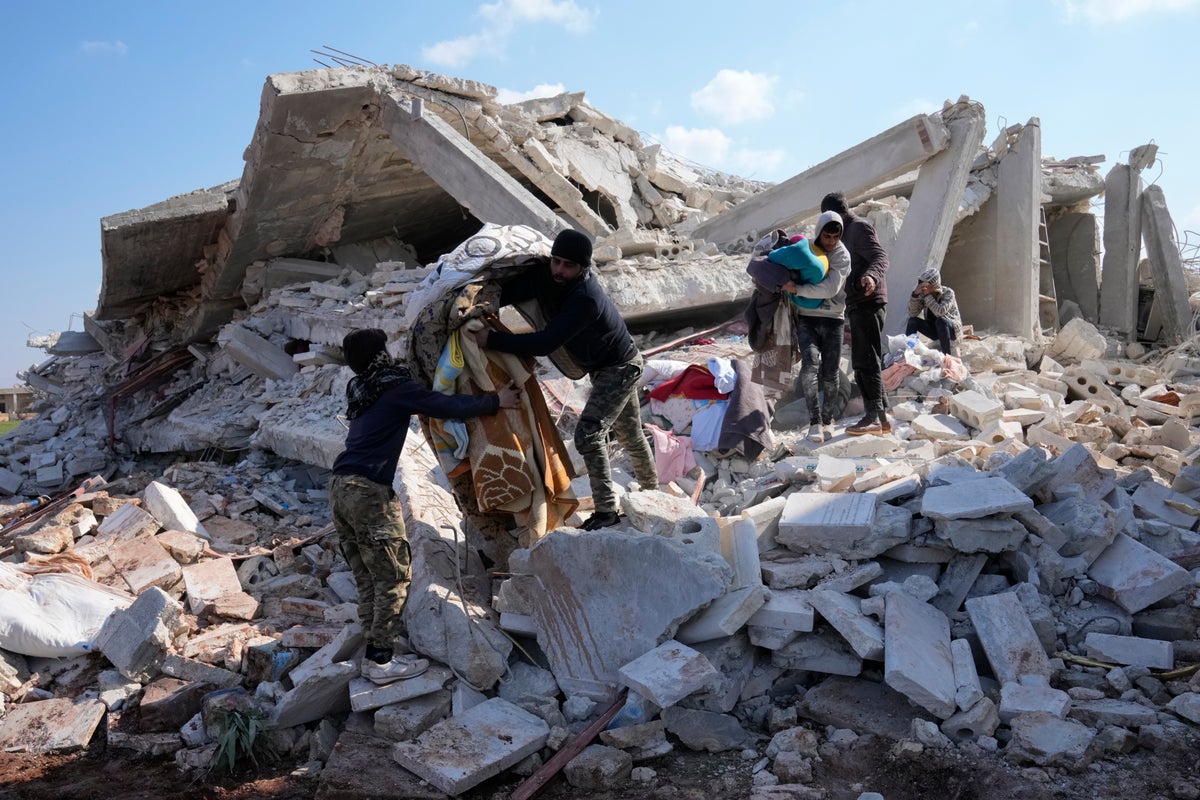
After years of war, residents of areas in northwest Syria struck by a massive earthquake are grappling with their new and worsening reality.
Almost one week after the devastating 7.8 magnitude earthquake struck northern Syria and neighboring Turkey, the U.N. has acknowledged an international failure to help Syrian quake victims.
In Atareb, a town that Syrian rebels still hold after years of fighting government troops, survivors dug through the debris of their destroyed homes on Sunday, picking up the remnants of their shattered lives and looking for ways to heal after the latest in a series of humanitarian disasters to hit the war-battered area.
Excavators lifted rubble and local men with shovels and picks destroyed columns to even out a demolished building.
Dozens of newly displaced families gathered for hot meal handouts from local volunteers and the local opposition-run government. A private citizen went tent to tent to give out wads of cash in a makeshift camp — the equivalent of about $18 — to each family.
Local Syrians were doing what they have honed over years of crises: relying on themselves to pick up the pieces and move on.
“We are licking our own wounds,” said Hekmat Hamoud, who had been displaced twice by Syria’s ongoing conflict, before finding himself trapped for hours beneath rubble.
The major earthquake that struck Monday hit hard Syria's northwestern rebel-held enclave, where over four million people for years have struggled to cope with ruthless airstrikes and rampant poverty.
Many are internally displaced from the ongoing conflict and living in crowded tent settlements. The quake killed over 2,000 people in the area, and displaced many more for a second time, forcing some to sleep under olive groves in the frigid winter weather.
U.N. Under-Secretary-General for Humanitarian Affairs Martin Griffiths, visiting the Turkish-Syrian border Sunday, acknowledged in a statement that Syrians have been left “looking for international help that hasn’t arrived.”
“We have so far failed the people in north-west Syria. They rightly feel abandoned,” he said.
“My duty and our obligation is to correct this failure as fast as we can.”
Northwest Syria relies almost entirely on aid for survival, but post-quake international assistance has been slow to reach the area. The first U.N. convoy to reach the area from Turkey was on Thursday, three days after the earthquake.
Before that, the only cargo coming across the Bab al-Hawa crossing on the Turkey-Syria border was a steady stream of bodies of earthquake victims coming home for burial — Syrian refugees who had fled the war in their country and settled in Turkey but perished in the quake.
U.N. aid sent from Turkey to Syria is only authorized to enter via the Bab al-Hawa crossing, and roads to the crossing were rendered impassable after the quake. While international aid can also be sent from Syrian government-held areas to rebel-held areas in the northwest, this faces its own set of hurdles.
Critics of the government of President Bashar Assad say that aid funneled through government-held areas in Syria faces bureaucracy and the risk that authorities will misappropriate or divert the aid to support people close to the government.
A convoy carrying U.N. aid that had been scheduled to cross into rebel-held Idlib from the government area on Sunday was canceled after its entry was blocked by the rebel group Hayat Tahrir al-Sham. The Department of Political Affairs in the Liberated Areas, linked to HTS, had said in a statement two days before that “the liberated areas do not have crossings with the criminal regime.” It asserted that Bab al-Hawa is the only crossing through which humanitarian assistance could enter.
Strips of northern Syria are held by a patchwork of sometimes-conflicting groups, further hindering aid deliveries. Turkish-backed rebels have blocked aid convoys from reaching earthquake victims that were sent by rival U.S.-backed Kurdish groups in neighboring areas.
Geir Pedersen, the U.N. special envoy for Syria, who landed in Damascus Sunday, told reporters, “We are trying to tell everyone, put politics aside. This is the time to unite behind the common effort to support the Syrian people.”
While aid has been slow to reach the northwest, a number of countries that had cut ties with Damascus during Syria's civil war have sent help to government areas. Arab countries including Egypt and the United Arab Emirates have stepped in, with the UAE's foreign minister visiting Damascus and meeting with Assad Sunday.
The head of the White Helmets, a civil defense group operating in the rebel-held northwest, Raed al-Saleh, said in a statement that Griffiths' visit was “too little, too late.”
Al-Saleh met with Griffiths to demand the opening of additional cross-border routes for aid to enter without waiting for authorization from the U.N. Security Council.
Saleh said local rescue teams’ calls for international assistance had gone unheeded for days “and during this time, countless lives have been needlessly lost.”
“The U.N.’s failure to act quickly to save Syrian lives in the face of a humanitarian catastrophe is utterly shameful and should be a stain on its conscience,” he said.
International Rescue Committee head David Miliband told the U.S. broadcaster ABC that “the world has moved on” from the Syrian crisis.
“But the crisis has not been resolved, and a forgotten crisis is not a resolved crisis,” he said, adding that the war had left Syrians “on the edge” so that when the natural disaster struck, they were “pushed over the precipice.”







